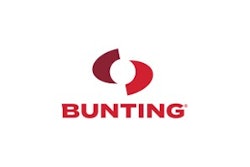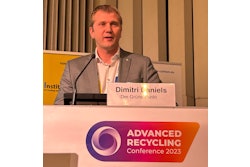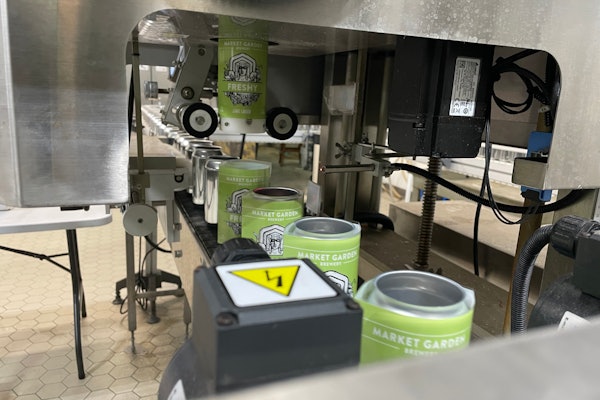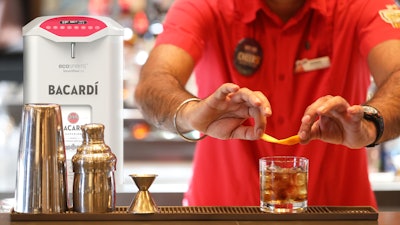
In what project stakeholders call a global first, Bacardi and Carnival Cruise Lines introduced a reusable, closed-loop packaging system called ecoSPIRITS to ships in the ocean cruise line industry. Meanwhile, British spirits brand owner Diageo, the maker of Johnnie Walker whisky, Don Julio tequila, and Guinness beer among other popular brands, announced its own global agreement with the circular economy technology company. And most recently, yet another partnership between ecoSPIRITS, a Las Vegas hotel, and a local craft distillery has landed the format on terra firma in the U.S. Having earned the interest of two spirits giants while gaining a toehold in the entertainment and revelry capital of the world, this emerging packaging format just might have legs—and not just sea legs.
The ecoSPIRITS format can most simply be described as a watercooler-style or keg-style model, only the 5-gal PET water bottle or aluminum beer keg is replaced in this model by a glass bottle of around 4.5 L, depending on the model. A bar or restaurant that serves a sufficient quantity of a certain spirit—say Smirnoff as a house vodka, or Bacardi Superior as a house rum—can simply swap out these large glass bottles into a dispensing device behind the bar, akin to a watercooler or beer tap. This saves a lot of single-use glass bottles to begin with—at a clip of about 4x since a typical spirits bottle is 1 L. But since those 1-L bottles are single-use and ecoSPIRITS glass bottles are reusable, the material savings is really amortized over at least 100 cycles in the bottle system's lifetime.
But large glass bottles are heavy, their cylindrical shape makes them prone to rolling (especially on a lurching cruise ship), and since glass shatters unlike plastic, they’re precarious to transport. The ecoSPIRITS model solves for this by enclosing these 4.5-L glass bottles in what it calls its ecoTOTE, a squat, protective secondary package that's equally reusable to the tune of 100 cycles. The whole ecoTOTE system consists primarily of glass, HDPE, and aluminum. Brand information is displayed on a brand plate, which is inserted into the ecoTOTE and is displayed on the cut-out window on two sides of the ecoTOTE. 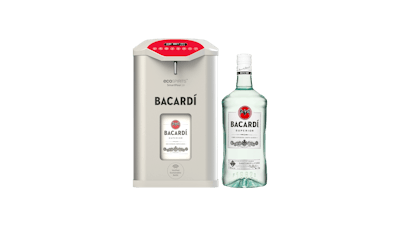 Collaborators say the Bacardi at Sea application an effort to significantly reduce single-use glass waste in the tourism and hospitality segment.
Collaborators say the Bacardi at Sea application an effort to significantly reduce single-use glass waste in the tourism and hospitality segment.
The ecoSPIRITS model consists of several different formats, sizes, and dispensing technologies, and they’re evolving and getting more sophisticated as the format matures. But more generally, they all use large, multi-liter refillable glass bottles that are filled with spirits, then affixed in a decorated, protective cube case, and finally used in a bar setting in a branded dispensing mechanism. The glass bottles carried by these cubes are filled, cleaned, and refilled over many cycles.
A bar or restaurant works its way through its supply of this spirit in the 4.5-L bottle while refill bottles are safely stored behind the bar or on a pallet in the backroom in their respective ecoTOTEs. Bottles are removed from the ecoTOTE for use, then returned to snap into place in the waiting ecoTOTE package when they’re empty.
This patent-pending closed loop system was first developed ecoSPIRITS in 2018. The company says it’s the world’s first low carbon, low waste distribution technology for premium spirits and wine.
Refilling can be done at local bottling facilities that contain a proprietary filling technology, a containerized semi-automated packaging facility dubbed the ecoPLANT, to reduce the distance the heavy bottles must travel. A year ago in December 2022, the first two ecoSPIRITS ecoPLANT refilling stations came online at Mango Bottling in Cocoa, Fla., and at the spirits brand Chareu in Southern California. A third is coming online in Las Vegas now--more on that later. In the Bacardi at Sea application, the ecoTOTEs are shipped to Carnival Cruise Line docks in pallet format from nearby Mango Bottling. In all cases, the ecoTOTEs are designed to nest together to facilitate stacking, and 125 ecoTOTEs fit on a pallet with a 5 x 5 x 5 configuration. All filling, both new and refill, is done at a nearby ecoPLANT location—Mango Bottling in the Carnival and Bacardi collaboration. All sanitizing and refilling of ecoTOTEs is done at these ecoPLANT locations, then ecoTOTEs are sent to the distributor, sent to the bar (or ship or casino), and returned to the same location containing the ecoPLANT. 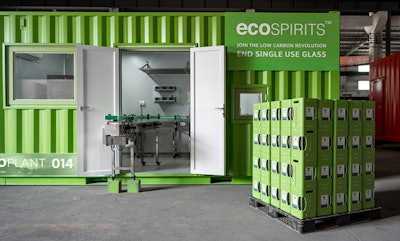 Refilling can be done at local bottling facilities that contain a proprietary filling technology, a containerized semi-automated packaging facility dubbed the ecoPLANT, to reduce the distance the heavy bottles must travel.
Refilling can be done at local bottling facilities that contain a proprietary filling technology, a containerized semi-automated packaging facility dubbed the ecoPLANT, to reduce the distance the heavy bottles must travel.
“The ecoTOTE remains in the same form and assembly when it departs from our co-packing partner Mango Bottling and when arrives on the boat and in the venue. Once in the venue, the ecoTOTE is paired with the SmartPour 1.1S/2.0S [dispensing device, like a keg tap or watercooler base] and is used until depletion. When the ecoTOTE is empty a full ecoTOTE replaces it, and this full one is again paired with the SmartPour technology. The SmartPour 2.0S connects with the ecoTOTE via the ecoTOTE Connector and this ensures a secure connection,” says Bob Syihabuddin, head of Circular Operations, ecoSPIRITS, of the Bacardi and Carnival application. This Bacardi at Sea format, with some application-specific tweaks, applies generally to the Diageo and Las Vegas initiatives as well.
Why Bacardi Got Onboard with Carnival for a Pilot
Collaborators say the Bacardi at Sea application is an effort to significantly reduce single-use glass waste in the tourism and hospitality segment.
“This partnership involves three companies: Bacardi Limited, Carnival Cruise Line, and ecoSPIRITS. The aim of the collaboration is to showcase a scalable circular packaging solution for spirits for the cruise industry, dramatically reducing the packaging waste and carbon footprint per spirits serve and saving weight and space onboard,” Paul Gabie, CEO, ecoSPIRITS told PW at the outset of the pilot in August, 2023. “The trial will test the operational integration of the new technology. At the end of the pilot, the three companies will explore rolling the technology out across additional spirits and ships within Carnival’s fleet.”
Carnival’s house-pour rum, Bacardi Superior, is one of the most-ordered spirits across Carnival’s fleet. Until this pilot, consumer demand for cruise ship favorites like daiquiris, mojitos, or other tropical rum drinks would typically be satisfied by bartenders with pours out of single-use glass 1-L bottles of Bacardi--the same single-use bottles found on retail shelves. Under this program, however, pours from those classic bottles are being replaced by pours from reusable 4.5-L glass bottles nested in the durable drink dispensing system. The glass packaging material savings is manifest.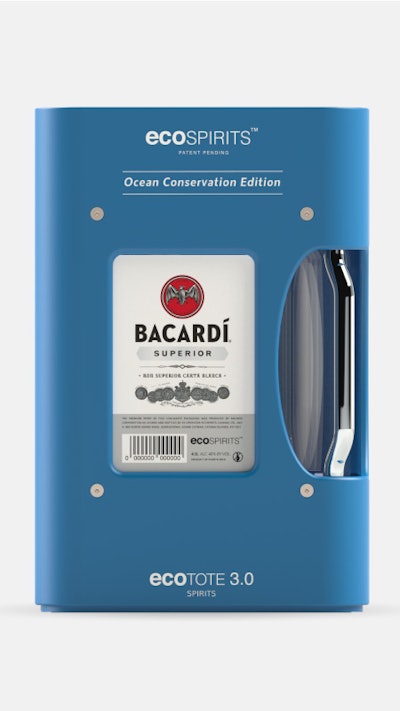 The ecoTOTE 3.0SC Cruise Edition is similar to the ecoTOTE 3.0S Ocean Blue ecoTOTE, but with some added features to suit the maritime environment, such as fasteners that replace existing rivets for secure storage at sea, and black aluminum anodizing for enhanced resistance to salt water-based corrosion.
The ecoTOTE 3.0SC Cruise Edition is similar to the ecoTOTE 3.0S Ocean Blue ecoTOTE, but with some added features to suit the maritime environment, such as fasteners that replace existing rivets for secure storage at sea, and black aluminum anodizing for enhanced resistance to salt water-based corrosion.
Specifically for this Bacardi and Carnival collaboration, ecoSPIRITS developed a specialized version of its 4.5-L ecoTOTE, what it calls its ecoTOTE 3.0SC Cruise Edition. This is similar to the ecoTOTE 3.0S Ocean Blue ecoTOTE, but with some added features to suit the maritime environment, such as fasteners that replace existing rivets for secure storage at sea, and black aluminum anodizing for enhanced resistance to salt water-based corrosion.
“As we strive to become the most environmentally responsible global spirits company, we are continuously looking for opportunities to deliver our beautiful drinks in more sustainable packaging and formats, helping us build to a greener future,” says Rodolfo Nervi, VP, Global Safety, Quality & Sustainability for Bacardi. “Innovating in closed loop packaging has been a top priority for us for a number of years, so launching our very first ecoTOTE for Bacardi rum on a Carnival cruise ship and seeing the doors this trial will open, is an incredibly exciting step forwards in that journey.”
For three months beginning in August 2023, Bacardi was delivered in ecoTOTE format to three of Carnival’s ships operating out of Miami: Celebration, Horizon, and Sunrise. Each of these vessels has a capacity of up to 6,338 passengers and 1,450 crew members. The largest is Carnival Horizon, which has 16 dining areas and several bars, including the RedFrog Pub and its sister venue, the RedFrog Rum Bar, where Bacardi rums feature prominently.
“As we continue to work towards our sustainability goals, the collaborative work of our beverage team, ecoSPIRITS, and Bacardi is a great example of thinking in ways that are truly out-of-the-box—or in this case out-of-the-bottle—to develop new partnerships and practices that further our ongoing efforts,” says Zachary Sulkes, senior director of beverage operations at Carnival Cruise Line.
The pilot will determine if reusable containers developed by ecoSPIRITS can be used to serve Bacardi rum on Carnival ships. Stakholders claim that by switching to ecoTOTE format, the Carnival ships will eliminate 95% of the single use packaging waste associated with their house-pour rum, dramatically reducing the carbon footprint per spirits serve and saving weight and space onboard. Within this pilot phase, approximately 9,400 bottles will be replaced by the ecoSPIRITS packaging system.
The rum is transferred from the ecoTOTE to serving format using ecoSPIRITS’ SmartPour dispensing technology. New silver and red Bacardi-branded SmartPours were placed in select bars on the three ships for beverage team members to serve cocktails featuring Bacardi Superior rum.
Notably, Carnival currently recycles single-use glass items. Each ship in the fleet is outfitted with a recycling center, where crew members sort paper, plastic, and glass recyclables. Last year, Carnival processed more than 11 million pounds of recyclables.
Diageo rollout
Unlike the localized closed loop pilot at sea, the agreement between Diageo and ecoSPIRITS is longer term and broader, providing a flexible framework that allows the brand owner to pilot and scale packaging in an expected 18 markets in the next three years. The collaboration will initially be across Diageo’s Gordon’s gin, Captain Morgan rum, and Smirnoff vodka. The global agreement follows the success of Diageo’s ongoing ecoSPIRITS program in Indonesia with Smirnoff, which started in 2022 and is now active in 38 bars.
“This is another example of a triple win where the planet, consumers and Diageo will all benefit. We will be able to reduce both carbon and cost and the pubs and bars will benefit from the ease of having reusable spirits packaging,” says Ewan Andrew, president, Global Supply Chain & Procurement, and Chief Sustainability Office at Diageo.
The ecoSPIRITS technology will enable Diageo spirits to be distributed in a 4.5-L ecoTOTE, similar to the Bacardi application. 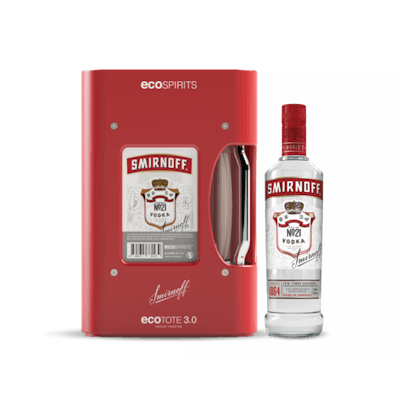 Bottles are removed from the ecoTOTE for use, then returned to snap into place in the waiting ecoTOTE package when they’re empty.
Bottles are removed from the ecoTOTE for use, then returned to snap into place in the waiting ecoTOTE package when they’re empty.
The collaboration is expected to deliver sustainability benefits to Diageo with reductions in carbon emissions and waste with the exact figures to be confirmed on conclusion of the three-year period. The Beyond the eliminatio of up to 1,000 glass bottles over their lifespan of 100-plus cycles, there is also an anticipated carbon footprint benefit after the inly sixth use, compared to that volume of liquid in 70-cL glass bottles.
The first markets in the global agreement are expected to go live in 2024. This is a step towards Diageo’s goal of reducing carbon emissions across the supply chain by 50% by 2030 and reaching net zero by 2050.
“ecoSPIRITS’ missions is to end single use glass in the spirits and wine industry. For the circular economy to achieve global scale, innovators like ecoSPIRITS need the support of industry leaders like Diageo in catalyzing the linear to circular packaging transition,” Gabie concludes. “As such, this new global partnership is a significant milestone for ecoSPIRITS and our journey to a circular future. We are grateful to our partners at Diageo for the seriousness of their commitment to a more sustainable and inclusive world.”
Diageo first started working with ecoSPIRITS through the Diageo Sustainable Solutions program in 2021. The program aims to find technology innovators that can bridge the innovation gap across Diageo’s supply chain to help the company reach its ESG targets.
Viva Las Vegas
In Las Vegas—an appropriate spot due to its high concentration of casinos, hotels, and bars—ecoSPIRITS’ licensed operator for the U.S. eS Operator USA I LLC is launching another application of the model. As part of the Nevada launch, a new ecoPLANT, the third in the U.S. market after Mango and Chareu, will be brought online in partnership with 17A Stillery LLC, a Las Vegas-based distillery. South Point Hotel, Casino & Spa will act as the launch customer, piloting the closed loop spirits technology for high volume casino beverage operations. As part of the launch, ecoSPIRITS has also developed a new technology solution to make its ecoTOTE format compatible with back-of-house systems known as ‘pump rooms’, which are commonplace in the casino industry. The Nevada ecoPLANT is now deploying spirits in ecoTOTE format, starting in January 2024.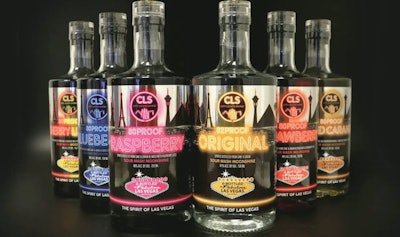 17A Stillery, which is famous for producing City Light Shine, is the host company for the Nevada ecoPLANT.
17A Stillery, which is famous for producing City Light Shine, is the host company for the Nevada ecoPLANT.
The ecoPLANT host for Nevada, 17A Stillery, produces City Light Shine, which is 100% distilled in Las Vegas from a traditional southern moonshine recipe using a whiskey-style mash to create moonshine in flavors such as blueberry and salted caramel. 17A Stillery was founded by Brendan Gaughan, whose family also owns the South Point Hotel, Casino & Spa. The South Point will be the first hospitality venue in Nevada to take delivery of spirits in ecoTOTE format, starting in January 2024, with others set to join shortly after.
“We are delighted that South Point Casino, Hotel & Spa will be the first venue in Las Vegas to work with ecoSPIRITS and we hope this paves the way for venues across the city to follow suit, so that we can work together to eliminate single use glass waste,” says Brendan Gaughan, Owner of The South Point Hotel, Casino & Spa and Founder of 17A Stillery. “We are also excited about 17A Stillery acting as the host facility for ecoSPIRITS’ ecoPLANT in Nevada, we are certain this site will become very busy very soon, as more venues look to make the transition to circular packaging technology for spirits.”
Though the Las Vegas Strip has elaborate neon lighting displays, many of the hotel resort properties have made extensive sustainability efforts, including water conservation, recycling, waste reduction, and energy efficiency programs. Renewable energy is generated and used on the Strip, while energy efficient buildings are also being implemented and this area has one of the highest concentrations of LEED-certified buildings in the world. The South Point casino is among those with sustainability high up on its agenda and its efforts include a focus on reducing water, waste, and energy usage. By taking delivery of spirits in ecoTOTE format, The South Point says it will help demonstrate the benefits of reducing single use glass waste in Las Vegas on a large commercial scale. PW




